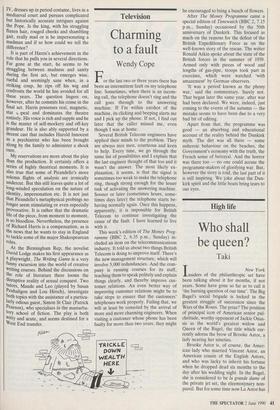Television
Charming to a fault
Wendy Cope
For the last two or three years there has been an intermittent fault on my telephone line. Sometimes, when there is an incom- ing call, the telephone doesn't ring and the call goes through to the answering machine. If I'm within earshot of the machine, its clicking and beeping alerts me and I pick up the phone. If not, I find out later that the caller missed me, even though I was at home.
Several British Telecom engineers have applied their minds to the problem. They are always nice men, courteous and keen to help. Every time, we go through the same list of possibilities and I explain that the last engineer thought of that too and it wasn't the answer. The most likely ex- planation, it seems, is that the signal is sometimes too weak to make the telephone ring, though strong enough for the lesser task of activating the answering machine. Sooner or later (sometimes hours, some- times days later) the telephone starts be- having normally again. Once this happens, apparently, it is impossible for British Telecom to continue investigating the cause of the fault. I have learned to live with it.
This week's edition of The Money Prog- ramme (BBC 2, 6.35 p.m., Sunday) in- cluded an item on the telecommunications industry. It told us about two things British Telecom is doing to improve itself. There's the new management structure, which will involve 5,000 redundancies. And the com- pany is running courses for its staff, teaching them to speak politely and explain things clearly, and thereby improve cus- tomer relations. An even better way of improving customer relations might be to take steps to ensure that the customers' telephones work properly. Failing that, we will at least be consoled by the arrival of more and. more charming engineers. When visiting a customer whose phone has been faulty for more than two years, they might be encouraged to bring a bunch of flowers.
After The Money Programme came a special edition of Timewatch (BBC 2, 7.15 p.m., Sunday) occasioned by the 50th anniversary of Dunkirk. This focused as much on the reasons for the defeat of the British Expeditionary Force as on the well-known story of the rescue. The writer Ronald Atkin spoke about the state of the British forces in the summer of 1939. Armed only with pieces of wood and lengths of gas-pipe, troops took part in exercises, which were watched 'with amazement' by German observers.
`It was a period known as the phony war,' said the commentary. Surely not. That began later the same year, after war had been declared. We were, indeed, just coming to the events of the autumn — the mistake seems to have been due to a very bad bit of editing.
Apart from that, the programme was good — an absorbing and educational account of the reality behind the Dunkirk myth. The dirt was all there — some unheroic behaviour on the beaches, the Government's economy with the truth, the French sense of betrayal. And the horror was there too — no one could accuse the programme-makers of glorifying war. But, however the story is told, the last part of it is still inspiring. We joke about the Dun- kirk spirit and the little boats bring tears to our eyes.


















































 Previous page
Previous page